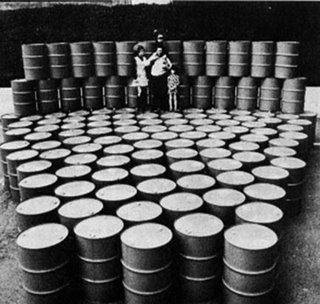The future energy supply

上世纪70年代的一张照片,一家人别石油桶包围
因为下午要在angew chem上找篇文章,看到这篇“The Future Energy Suppply:Chanllenges and Opportunies”(2006, vol 45),兴致颇高的看了几页,16页长文,真要看完也得不少时间。 其中不少言语颇有意思,摘录如下,之前所知确实太少!
Currently the world’s growing thirst for oil amounts to almost 1000 barrels a second,which means about 2 liters a day per each person living on the Earth.
Some people say that modern industrial agriculture is, in fact, the use of land to turn oil and gas into food.
The second law of thermodynamics states that, in a closed system, there are limitations that cannot be overcome; apparently, several economists are not acquainted with this simple principle.
“There is big disproportion between the extensive use we make of energy and the scarce knowledge we have of it.”
how energy is taught in our schools and universities?
Of course, the most exposed to the “external” effects related to climatechange are deprived people, as shown in the aftermath of Katrina in New Orleans.
Since more energy yields more goods and more services, one could believe that the well-being of people increases with increasing consumption of energy.
如此种种,我只是觉得我们对这样切身相关而又重要的问题重视的显然远远不够。
为什么呢?
当然正如title中所说,这不仅仅是chanllenges还是opportunies.
The energy crisis is a challenge, but, indeed, also an opportunity. It offers a precious chance to become more concerned about the world in which we live and the society that we have constructed.
It is actually an opportunity for scientists to take an active role in protecting the Earth and helping to change what is wrong in our social and political organization, beginning with the huge disparity between the rich and the poor.
We are well aware that the stability of human society decreases with increasing disparities.





没有评论:
发表评论